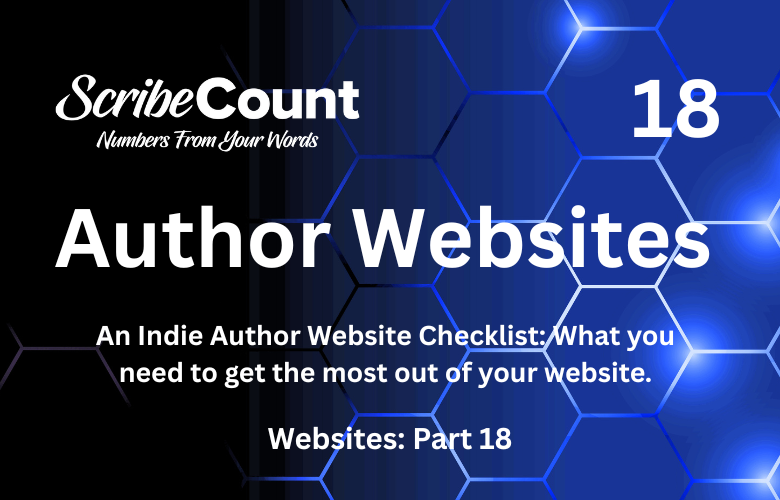The Indie Author Website Checklist: Everything* You Need to Build a Professional, Sales-Ready Website for Your Author Brand.
Note the *. No checklist will contain everything that may help you build the ultimate author website, but we've done our best to include what we feel makes a good one.
As we've mentioned a few times already, a successful indie author website is more than just a digital business card—it's your marketing engine, brand hub, and direct-to-reader storefront. Whether you're just starting out or looking to level up, this comprehensive checklist outlines every element needed for a high-performing website that includes e-commerce, lead capture, reader engagement, and automation tools. Print it, check items off, and use the extra space at the end to jot down specific needs or ideas tailored to your author journey.
DOMAIN & HOSTING
Custom Domain Name — Purchase a professional domain (e.g., www.yourname.com) from Namecheap or Google Domains. This gives you a clean, memorable web address for your author brand.
Hosting Service — Choose reliable hosting from SiteGround, or WP Engine to ensure speed, uptime, and support for your site.
SSL Certificate — Needed for secure HTTPS browsing and buyer trust; often included with your hosting plan.
Website Backups — Protect your content with scheduled backups using Jetpack or UpdraftPlus.
WEBSITE PLATFORM
WordPress.org — Self-hosted WordPress is the industry standard for flexibility and plugin support. Learn more at WordPress.org.
Premium Theme — Use a clean, responsive theme like Astra, Divi, or Author Pro for a professional layout.
SITE DESIGN & PAGES
Home Page — Your landing zone should showcase your brand, newest book, and a compelling call to action (CTA) to buy or subscribe.
About the Author Page — Builds reader trust with your bio, writing journey, and professional headshot.
Book Pages — Create individual pages for each book featuring covers, blurbs, links to buy, reviews, and bonus content.
Storefront — Your own shop using WooCommerce or Easy Digital Downloads to sell directly to readers.
Blog Section — An optional but powerful tool for SEO, connection, and updates.
Contact Page — Include a form with WPForms and links to your email and social media.
Legal Pages — Protect yourself with Privacy Policy, Terms of Use, and Cookie Notice pages; use Termly to create them.
E-COMMERCE INFRASTRUCTURE
Shopping Cart System — Use WooCommerce for physical and digital products, fully integrated with WordPress.
Payment Gateways — Accept secure payments via PayPal and Stripe.
Secure Digital Delivery — Ensure buyers receive their downloads using BookFunnel, Easy Digital Downloads, or Payhip.
Inventory Management — Automate your digital and physical product management using WooCommerce settings or inventory plugins.
Automatic Tax Calculations — Tools like TaxJar or WooCommerce Tax simplify sales tax compliance.
Shipping Integration — For print books, use ShipStation or WooCommerce's native shipping options.
EMAIL MARKETING
Email Marketing Service — Build your reader list with tools like MailerLite, ConvertKit, or Mailchimp.
Lead Magnet — Offer a free ebook or chapter in exchange for email signup.
Signup Forms — Add attractive pop-ups and embeds using Bloom or OptinMonster.
Welcome Sequence — Set up an automated series of onboarding emails to engage new subscribers.
Newsletter Planning — Build consistent reader connection with scheduled campaigns and reusable templates.
ANALYTICS & SEO
Google Analytics (GA4) — Track website traffic and user behavior with Google Analytics.
SEO Plugin — Optimize your site for search engines using Yoast SEO or Rank Math.
Search Console — Submit your site to Google Search Console for indexing and performance tracking.
Meta Data — Use your SEO plugin to define custom titles and descriptions for every page and post.
Sitemap Plugin — Automatically generate a sitemap for indexing with plugins like Yoast or Google XML Sitemaps.
SOCIAL & MARKETING INTEGRATION
Social Profile Links — Link your author accounts on Facebook, Instagram, Threads, TikTok, YouTube, and X (Twitter).
Share Buttons — Add share tools with Shared Counts or Sassy Social Share.
Open Graph Tags — Use your SEO plugin to format social media previews.
Embedded Media — Optional integrations for your podcast or YouTube channel.
ScribeCount Integration — Connect to ScribeCount for real-time royalty and sales tracking from your dashboard.
AUTOMATION & USER EXPERIENCE
Responsive Design — Ensure your website works smoothly on phones, tablets, and desktops.
Performance Optimization — Speed up your site with WP Rocket and compress images using Smush.
Accessibility — Make your site usable for everyone by adding alt tags, good contrast, and readable fonts.
Live Chat or Contact Widgets — Offer real-time support using Tawk.to or LiveChat.
Scheduled Backups — Automate your site’s backup plan for peace of mind using plugins like UpdraftPlus.
BONUS ELEMENTS
Author Logo & Favicon — Develop your visual brand with a custom logo and site icon.
Testimonials — Display quotes from readers or reviewers to build credibility.
Media Kit — A downloadable PDF or page with your bio, book list, headshot, and contact info for media inquiries.
Event Integration — Use a calendar plugin or embed Google Calendar for appearances.
Coupon System — Offer promotions using WooCommerce coupon settings.
Cart Recovery — Recover lost sales with plugins like WooCommerce Cart Abandonment Recovery.
Membership Tools — Use MemberPress or Patreon Connect to reward fans with exclusive content.
Affiliate Tracking — Use Pretty Links to manage referral links and affiliate partnerships.
CONTENT TO PREPARE
Author Bio & Headshot — A polished paragraph and professional photo for use throughout your site and press.
Book Covers — High-res images of your books in 2D and 3D formats.
Blurb Copy — Back cover and promotional text for each book.
Blog Content — Drafts and outlines to support SEO and reader engagement.
Lead Magnet — Prepare a short story, novella, or sample chapters.
Store Descriptions — Product pages with descriptions, tags, pricing, and delivery info.
If you have all that you are on your way to having an author website that will not only serve as a landing space for readers to find you, but a place to market you and your books for years to come. Build a strong foundation first, and then construct your author home on top.
Don't forget the cat pics!

